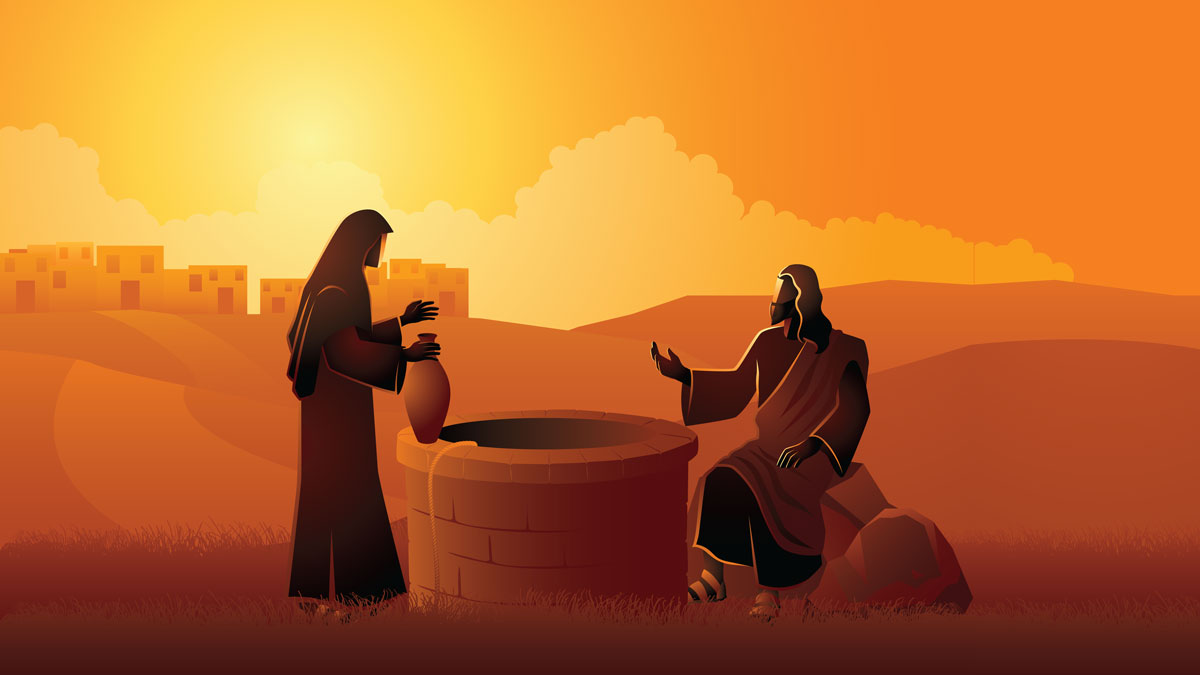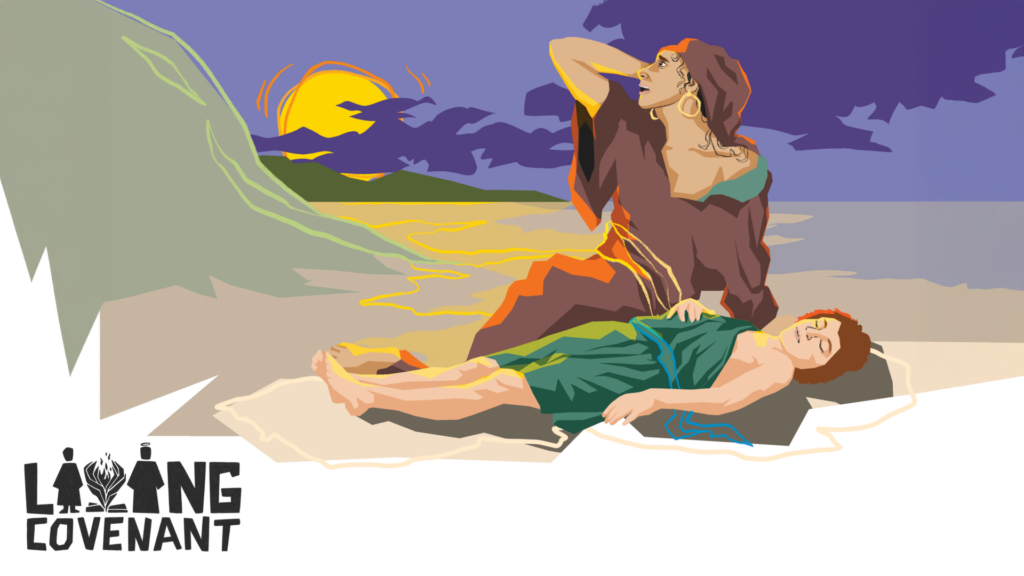If I were to ask you what your greatest desire is, how would you answer? For many of us, the response would be “love”. Each of us has a deep and abiding desire for perfect love, but in our pursuit of this love, we can often be hurt, rejected, betrayed and let down; leading us to put up emotional barriers to stop ourselves from getting hurt.
One woman in the Bible understood, perhaps more than most, this struggle: the Samaritan woman. In this story, we find a broken woman who had spent her entire life pursuing love, only to be disappointed at every turn. While inwardly she longs for something better, she refuses to entertain this hope, instead putting up barrier after barrier, made clear in her interactions with Jesus.
She meets Jesus in the heat of the day at the well, avoiding the other women from the village and their scorn. Typically, she would perform this ritual alone; except this day a man—a Jew—was waiting for her.
Barrier 1 – Cultural Divide:
Upon being asked for a drink, the woman is startled. This man should not be speaking to her because Jews did not associate with Samaritans (John 4:9). The Jews had rejected the Samaritans as fellow Israelites, resulting in a great rift between these people groups. And yet here was Jesus (a Jew) side-stepping this major issue of identity and culture, to ask her (a Samaritan) for a drink.
Naturally, she is wary of Jesus’ intentions and puts up the first barrier of self-preservation. She has never encountered a kind Jew before . . . let alone many kind men. Understanding her concern, Jesus tactfully overlooks the cultural divide and addresses who He is and why He is there at the well: to offer her living water.
Barrier 2 – Challenge to Jesus’ authority and claiming her right to the well:
In verses 11 and 12 we see the woman’s second barrier arise as she challenges Jesus’ authority to offer her living water. Sensing that Jesus is talking about spiritual things, she redirects the conversation back to the literal well of water, revealing her fear to address the deeper pains her heart has suffered. And in doing so, this woman challenges Jesus’ authority to provide any kind of “spiritual” water. After all, who is this random stranger in comparison to Jacob, the forefather of Israel, who first provided the well?
Not only does the Samaritan woman redirect the conversation away from spiritual things, but she also raises another major point of contention between Jews and Samaritans by bringing up her right to draw from the well as a descendant of Israel. You see, the Jews from Samaria had intermarried with Gentile colonists during the Babylonian exile and were not considered true Israelites by the Jews. But here the woman is clinging to her Israelite heritage and claiming her right to the spiritual inheritance of their forefathers. But Jesus ignores her attempt to redirect the conversation and simply tells her about the spiritual water He is offering. He can see her thirst for love and offers her a gift to satisfy her thirst.
Barrier 3 – Immediacy of her issues:
While the Samaritan woman indicates genuine interest in the gift Jesus is offering, she is only interested insofar as it can solve her immediate problem of collecting water. Here we see her putting up the third barrier. She makes it clear that the gift Jesus is offering sounds nice, but how could it possibly solve her immediate problems? After all, religion has only ever made her problems worse in the past.
So, how does Jesus reply? Verse 16 says, “He told her, ‘Go, call your husband and come back.’” Jesus brings up a contextual norm as a conduit to address the woman’s problem with seeking love in relationships. You see, it was customary back then that women were not to be educated or taught in spiritual matters, except if their husband or father were present. Women needed a male relative’s approval for education in matters of public life.
Barrier 4 – Contextual Perceptions of Gendered Rights to Education:
When the woman responds that she has no husband, she raises a fourth barrier, using the contextual perceptions of gendered rights to education to put distance between herself and Jesus. She has no man whom she can call to approve further education from Jesus. But Jesus continues to talk with this woman about spiritual matters without a husband or father present. He goes on to reveal—without any judgement—the truth about the woman’s past. He highlights the issue that has brought her to this moment; the issue which has driven her from God, from religion and from society, bringing her to this very well. Jesus points out her issue is that of desperately desiring perfect love.
Jesus has hit home, and the Samaritan woman is caught off-guard. Afraid of vulnerability and getting hurt from where this conversation might go, the woman quickly changes the topic yet again.
Barrier 5 – Theological Disagreement over Place of Worship:
In verses 19 to 24, the woman admits that Jesus must be a prophet since He clearly knows her life story. But this was getting far too personal for her liking, so she brings up a fifth barrier—the biggest theological issue between Samaritans and Jews since the time of King Jeroboam—their place of worship.
Back when Israel was divided under the reign of King Rehoboam into the two kingdoms of Israel and Judah, King Jeroboam established high places in the northern kingdom of Israel to avoid the Israelites travelling to Jerusalem in Judah to worship God (1 Kings 12). Because of this, Israelites throughout history would worship God at these high places rather than in Jerusalem. This theological dispute had endured centuries, with religious leaders judging Israelites’ religiosity based on where they worshipped, the high places or Jerusalem.
The Samaritans worshipped in a temple on Mount Gerizim in Samaria. However, in the year 129 BC, the Jews destroyed this temple, adding to the hostility between the two groups. All the Samaritans believed Mount Gerizim was the place of true worship, being built according to the laws of Moses. So, when the Samaritan woman brings it up to Jesus, a Jew, she is drawing attention away from herself and yet again revealing her problems with how religious bodies have judged her and her people.
But Jesus’ response is incredible. He does not deny the truth about history or discredit the important spiritual undertones of the debate the woman has raised. Instead of arguing theology, Jesus instead addresses the heart of the issue—that of worship. Jesus teaches her that the place of worship is not so important, but what matters is the worship itself—that it is genuine, true and earnest. This is what God desires from His people: their hearts, not their presence in a building.
Barrier 6 – The Messiah is the only One with answers:
By this point, the Samaritan woman recognises that Jesus is overcoming every barrier she puts up, and she is afraid. Jesus has been offering her hope in everything He has said, but she is afraid to indulge this hope and open herself up to accept His gift of living water.
So, in a last-ditch attempt to prevent being disappointed once again, she tries to put an end to the conversation with a sixth and final barrier: the Messiah. While Jesus can say all these wonderful things, her heart will remain shut-up until the Messiah comes. Everything in this woman’s life was too messy to be fixed by just one man with a few nice things to say. She knew she needed a Saviour and was determined to keep everything—her pain, her disappointments, her yearning for love—buried deep inside until that time came. She was waiting for true restoration and the true living water to satisfy her soul.
John 4:25,26 reads, “The woman said, ‘I know that Messiah’ (called Christ) ‘is coming. When he comes, he will explain everything to us.’ Then Jesus declared, ‘I who speak to you am he.’”
Jesus reveals that He IS the fulfilment of her hope. He IS the perfect love she has been seeking and the restoration that she longs for. She doesn’t have to keep her hurt and disappointment and mess hidden anymore, because He is the Messiah. . . and He was here for her. Literally, right there—at the well—just for her.
Everything she had ever been looking for in life had come to find her. Jesus had side-stepped every barrier that stood between her and God to reach her heart. That which had driven her away from God, her desire for perfect love, was the very thing which came to the well that day to bring her back to God. Except this time, her desire for perfect love was made complete in Him.
Each of us sets up mental and emotional barriers inside our hearts to avoid getting hurt. But God’s love will never let us down and has overcome every barrier, even death, to offer us hope. His love is the answer we have all been searching for—the fulfilment of our heart’s greatest desire.
Olivia Fairfax is an editorial assistant at Adventist Media.






